人教版高中英语必修二unittheolympicgamesWarmingup公开课-PPT
- 格式:ppt
- 大小:3.17 MB
- 文档页数:17
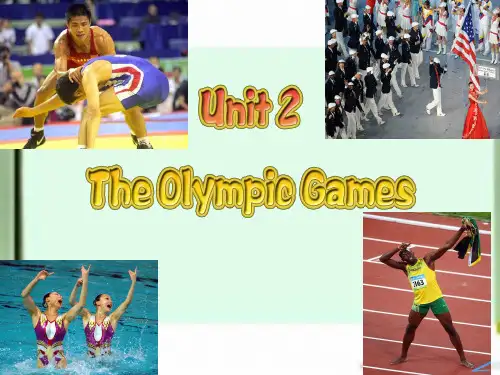
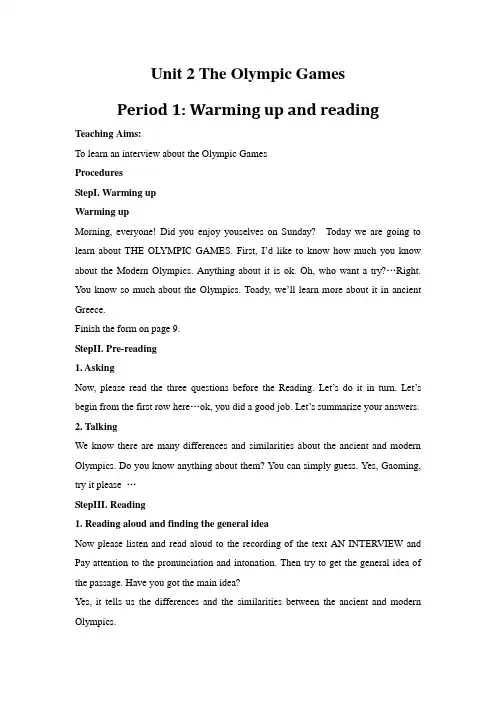
Unit 2 The Olympic GamesPeriod 1: Warming up and reading Teaching Aims:To learn an interview about the Olympic GamesProceduresStepI. Warming upWarming upMorning, everyone! Did you enjoy youselves on Sunday? Today we are going to learn about THE OLYMPIC GAMES. First, I’d like to know how much you know about the Modern Olympics. Anything about it is ok. Oh, who want a try?…Right. You know so much about the Olympics. Toady, we’ll learn more about it in ancient Greece.Finish the form on page 9.StepII. Pre-reading1. AskingNow, please read the three questions before the Reading. Let’s do it in turn. Let’s begin from the first row here…ok, you did a good job. Let’s summarize your answers.2. TalkingWe know there are many differences and similarities about the ancient and modern Olympics. Do you know anything about them? You can simply guess. Yes, Gaoming, try it please …StepIII. Reading1. Reading aloud and finding the general ideaNow please listen and read aloud to the recording of the text AN INTERVIEW and Pay attention to the pronunciation and intonation. Then try to get the general idea of the passage. Have you got the main idea?Yes, it tells us the differences and the similarities between the ancient and modern Olympics.2. ScanningNow read the text again. You shall try to finish the task: What was the ancient Olympics like? What is the modern Olympics like?3. Careful ReadingOk, now let’s read it silently. First let’s find the main sentences of each paragraph and talk about the similarities and the differences between the ancient and modern Olympics. Who can answer? Any volunteers?The similarities①Both are held every four years.②Both are held not for money but for honour.③The beliefs are the same. They are: Swifter, Higher, and stronger.④Men are allowed to take part both in ancient and modern Olympics.⑤Some events are the same, such as running, jumping, shooting andthowing.The Differences①There were not winter Olympics in the past.②Now competitors are from all over the world. But in the ancient time,only the people in Greece could take part.③Only men were allowed to take part in the past, now woman are alsoallowed.④In the past, winners got the olive wreath as the prize. Now competitorscompete for medals.⑤The events and athletes in modern time are more than those in the past. There is a special village for the competitors to live in, a stadium for competitions, a gymnasium for these who watch the games now. But there were not in the past.)StepⅣPractisedo the comprehending exercises 1 & 2.StepV summarizingDo the summarizing exercises on English WeeklyStep VI HomeworkDo exercises on the workbook。
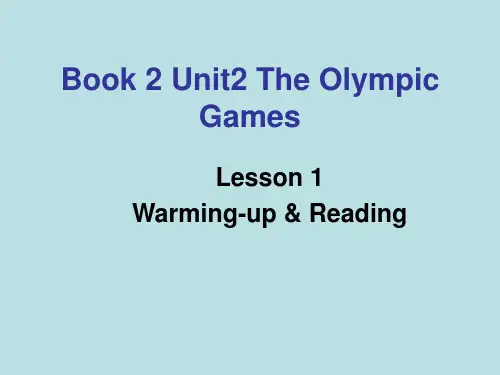
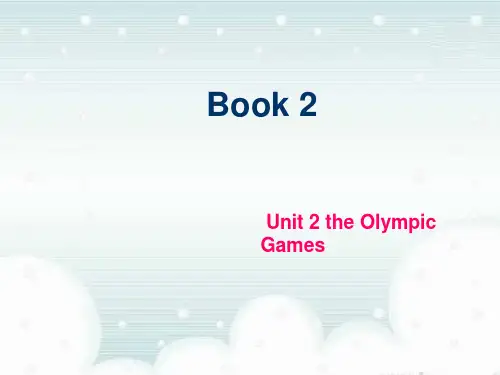
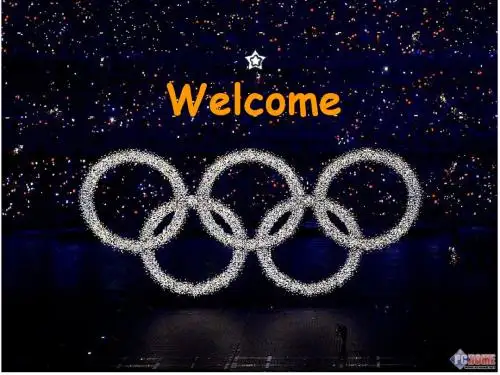
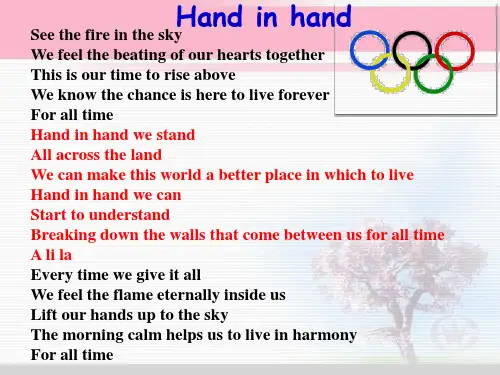
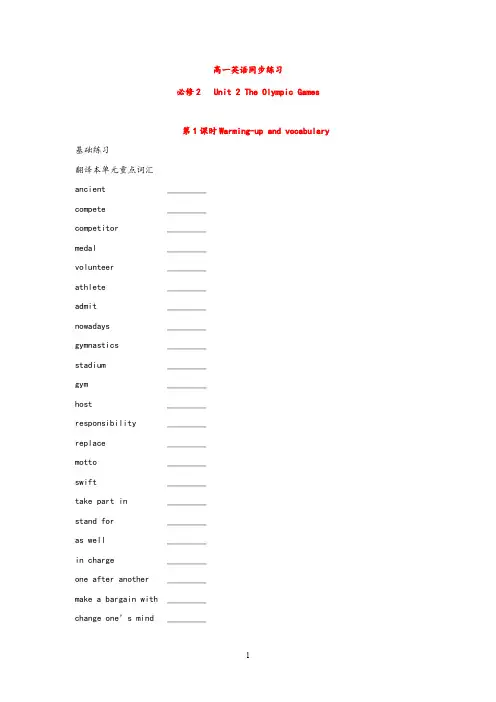
高一英语同步练习必修2 Unit 2 The Olympic Games第1课时Warming-up and vocabulary 基础练习翻译本单元重点词汇ancient _________compete _________competitor _________medal _________volunteer _________athlete _________admit _________nowadays _________gymnastics _________stadium _________gym _________host _________responsibility _________replace _________motto _________swift _________take part in _________stand for _________as well _________in charge _________one after another _________make a bargain with _________change one’s mind _________实战演练一. 将所给单词与其意相符的解释连线admit 1.to provide the place and everything needed for an organized event host 2.to start doing something instead of another personreplace 3. to allow someone to join an organization or event as a member compete 4. a short sentence or phrase used as a guide or rule of behaviour motto 5 to take part in a race, contest, examination二. 根据首字母填写单词1. Many s_______ will be built for the Olympics.2. He was given a m________ for his 40 years’ teaching.3. We Chinese successfully h______ the Beijing Olympic Games in .4. The first Olympic Games began in a______ Greece.5. N________ many people travel by air.反馈检测单项选择1. Do you know how many gold ______China gained in the Beijing Olympic Games?51.A. coinB. prizesC. medalsD. rewards2. Don’t worry. I will help to act as ______for the guests.A. holdB. hostC. waitD. charge3. If you ________you should keep it.A. do a promiseB. bring a promiseC. make a promiseD. show a promise4. It is _______ to check whether the flight times have changed or not before youleave.A. brightB. swiftC. magicalD. wise5. Daming made a _______with his mother, “ Give me two yuan, and I will sweep thefloor.”A. answerB. bargainC. priceD. reply6. Six children _________for the first place in the 100-meter race and in the end,Tim won.A. ranB. arrivedC. competedD. took part in7. The old building will be torn down and _______with a new supermarket.A. replacedB. took placeC. builtD. in place8. We can’t ________other countries in trade if we don’t develop our economy.A. compete forB. compete againstC. catch up D.catch with9. Tom _______that he had stolen the wallet.A. allowedB. permitC. fearedD. admitted10. James went swimming ___________ when he was young.A. every other dayB. every two dayC. every a few daysD. every a day第1课时 Warming up ﹠vocabulary基础练习(答案略)一. admit -3 host -1 replace-2 compete-5 motto-4二. 1 stadiums 2 medal 3 hosted 4 ancient 5 Nowadays1~5 CBCDB 6~10 CABDA。
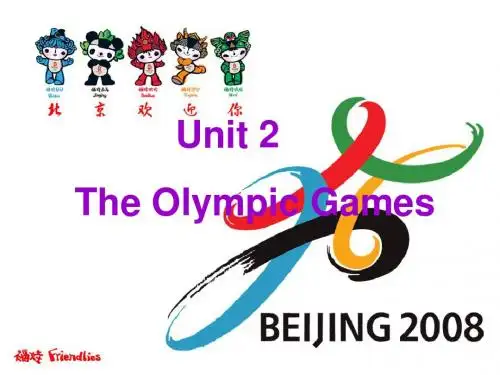
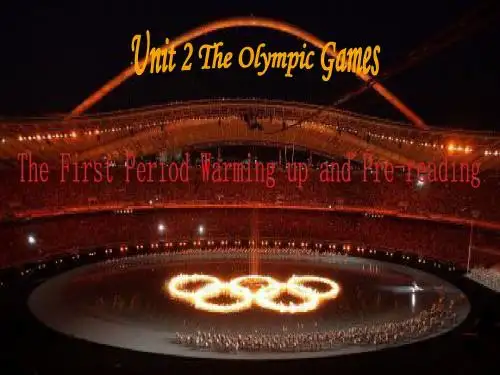
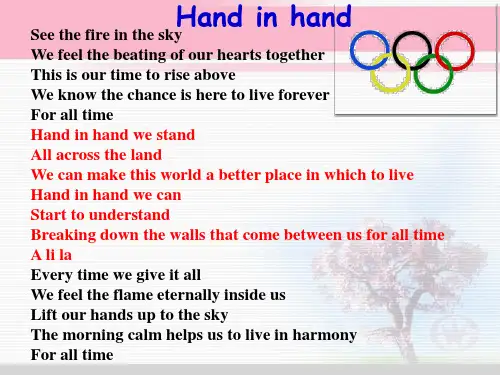
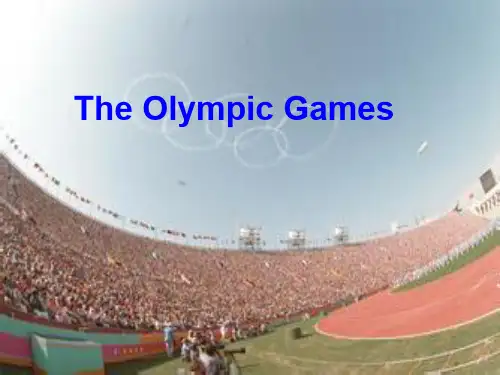
高一英语同步练习必修2 Unit 2 The Olympic Games第1课时Warming-up and vocabulary 基础练习翻译本单元重点词汇ancient_________compete_________competitor_________medal_________volunteer_________athlete_________admit _________nowadays_________gymnastics_________stadium_________gym_________host_________responsibility_________replace_________motto_________swift_________take part in_________stand for_________as well_________in charge_________one after_________another_________make a bargainwithchange one’s_________mind实战演练一. 将所给单词与其意相符的解释连线admit 1.to provide the place and everything needed for an organized eventRFe54zLQwIhost 2.to start doing something instead of another person RFe54zLQwIreplace 3. to allow someone to join an organization or event as a memberRFe54zLQwIcompete 4. a short sentence or phrase used as a guide or rule of behaviourRFe54zLQwImotto 5 to take part in a race, contest,examinationRFe54zLQwI二. 根据首字母填写单词1. Many s_______ will be built for the Olympics.2. He was given a m________ for his 40 years’teaching.RFe54zLQwI3. We Chinese successfully h______ the Beijing OlympicGames in 2008.RFe54zLQwI4. The first Olympic Games began in a______Greece.RFe54zLQwI5. N________ many people travel by air.反馈检测单项选择1. ---Do you know how many gold ______China gained in theBeijing Olympic Games?RFe54zLQwI--- 51.A. coinB. prizesC. medalsD. rewards2. Don’t worry. I will help to act as ______for theguests.RFe54zLQwIA. holdB. hostC. waitD. charge3. If you ________you should keep it.A. do apromise B.bring a promiseRFe54zLQwIC. make a promiseD.show a promiseRFe54zLQwI4. It is _______ to check whether the flight times havechanged or not before you leave.RFe54zLQwIA. brightB. swiftC. magicalD. wise5. Daming made a _______with his mother, “ Give me twoyuan, and I will sweep the floor.”RFe54zLQwIA. answerB. bargainC. priceD.replyRFe54zLQwI6. Six children _________for the first place in the 100-meter race and in the end, Tim won.RFe54zLQwIA. ranB. arrivedC. competedD. took partinRFe54zLQwI7. The old building will be torn down and _______with a newsupermarket.RFe54zLQwIA. replacedB. took placeC. builtD. inplaceRFe54zLQwI8. We can’t ________other countries in trade if we don’tdevelop our economy.RFe54zLQwIA. compete forB. compete againstC. catch up D.catch with9. Tom _______that he had stolen the wallet.A. allowedB. permitC. fearedD.admittedRFe54zLQwI10. James went swimming ___________ when he wasyoung.RFe54zLQwIA. every other dayB. every two dayC. every a few daysD. every a day第1课时 Warming up ﹠vocabulary基础练习 <答案略)一. admit -3 host -1 replace-2 compete-5 motto-4RFe54zLQwI二. 1 stadiums 2 medal 3 hosted 4 ancient 5 NowadaysRFe54zLQwI1~5 CBCDB 6~10 CABDA申明:所有资料为本人收集整理,仅限个人学习使用,勿做商业用途。
Unit 2 The Olympic Games,Book 2Period 1: Warming up and reading★Learning Aims:1.Knowledge aims:To learn about some basic knowledge of the ancient and modern Olympic GamesTo master the new words and expressions in this passage2.Ability aims:T o understand the general idea of the new text to train the reading ability of the studentsTo be more familiar with some reading skills ,such as scanning ,summarizing etc.3.Emotional aims:To arouse the students’ interest in the Olympic Games and get them to understand the Olympic spirit better.★Key points:To understand the general idea of the textTo improve the students’ reading ability further★Difficult points:To retell the textTo use words and expressions learnd in this text to communicate freely.★Teaching methods:Task- based teaching and the integral teaching method★Learning methods:To use some reading skills to understand the text betterTo be more active in group activities★Teaching aids: multimedia a tape recorder★Teaching and learning Procedures:StepI. Warming upLead in the lesson by showing the students a short movie about the 2008 Beijing Olympic games.Warming up by checking the preview plansToday we are going to learn about THE OLYMPIC GAMES. But first, I’d like to know how well you have prepared for the class…now, take out your preview plans.Check the answers to the exercises on the prewiew plans with the whole class.Get the students to raise the difficulties or problems they met with in their previewing. StepII. ListeningLook at the title and the pictures and predict the content. Then listen to the tape carefully and see if you were right. Then try to get the general idea of the passage.After listening,ask:Have you got the main idea?①Step III.Fast readingNow read the text quickly and silently. The boys shall try to finish the task: What was the ancient Olympics like? The girls shall try to finish the task: What is the modern Olympics like?Then talk about the similarities and differences between the ancient and modern Olympics.②StepⅣ.Careful readingRead the text more carefully and finish two tasksTask 1 Decide which are true and which are false:③1.There are two sets of Games- the Summer and the Winter Olympics and both are held every four years.( )2. The Winter Olympics are usually held two years after the Summer Olympics.( )3. Slaves and women were allowed to take part in the Games.( )4. The 2004 Olympics were held in Greece.( )5. People in the modern Olympic Games compete for money.( )Task2. Ask and answer :SB, P11 Ex2.StepV. RetellingRetell the text according to the following key wordsT he ancient Olympics…every four years…be not allowed to…the modern Olympics ..two sets of…not only…but also…the opportunity to …compete for …the motto……StepVI ExerciseF ill in the blanks:④The _______Olympic Games began in Greece and were held from 776 B.C. to A.D.393. It was held_______ four years. At that time, there were not so many sports as today. And women were not________to take part in the games. There were not Winter Olympics at that time. Winners got the________wreath as the prize. .The_______ Olympic Games began in 1891. They’re held every four years. There are two sets of Games ----the Winter and the Summer Olympics.In the summer Olympics there are over 250 different sports. Women are_____ ______ allowed to join in ______ play a very important role. Now the competitors compete for medals. The motto is _____ ______and_______.Step VII .DiscussionDiscuss this question in groups:Why do many countries want to host the Olympic Games while others do not. Then prepare for a class discussion..StepVIII. SummarySum up the lesson by a quiz about the Olympic games1.What’s the name of the country where the first Olympics began?2.What’s the large building called in which many outdoor sportsevents are held?3.What’s the Olympic motto?4.This is an award giwen to the top threewinners in each event in the Olympics?5.how often are the Olympic Games held?StepIX HomeworkTask 1 Translate the following phrases1. _______________ 每四年2._______________ 扮演角色3. _______________ 为了……荣誉4. _______________ 一套5. _______________ 与……结婚6. _______________ 改变主意7._______________ as well 8. _______________ one after another9. _______________take part in 10. _______________ as a matter of fact11. _______________be admitted as 12. _______________be admitted to/into13. _______________compete against sb 14. _______________take part15. _______________join in 16. _______________ 古代奥运会17. _______________冬奥会18. _______________夏奥会19. _______________奥运会Task2 Multiple choice1. The games which the young man were difficult to play.A. take part inB. attendedC. joinedD. joined in2. Have you heard of Oxford University? It’s _______ to be quite a famous one.A. saidB. toldC. spokenD. talked3. The harder you , the better progress you .A. will work; will makeB. work; have madeC. work; will makeD. will work; make4. Make sure that the windows before you .A. are shut; leaveB. were shut; leaveC. will be shut; leftD. have been shut; left5. In the last World Cup Competition, the German Women Team all the other womenteams and the world championship.A. won; wonB. won; gotC. beat; wonD. beat; received6. “You can’t catch me!” Janet shouted, away.(2005.NMET3)A. runB. runningC. to runD. ran7. Tom: Mike, our team will play against the Rockets this weekend. I’m sure we will win.Mike: ! (2005. 广东)A. Good luckB. CheersC. Best wishesD. Congratulations8. On May 5,2005, at World Table Tennis Championship, Kong Linghui and Wang Hao won the gold medal in men’s doubles with score of 4:1.(2005.江苏)A. a; aB. /; theC. a; /D. the; a9. Bob ran the 100 metres in 9.91 seconds, and I have not seen one this year.(2005.浙江)A. the best B. a better C. the most D. more10. Bread and butter at the restaurant. It is unnecessary to go out for breakfast.A. are servedB. servesC. is servedD. serveo1. Asking and answering w, please read the three questions before the Reading. Let’s do it in turn. Let’s begin from the first row here…ok, you did a good job. Let’s summarize your answers.2. Imaging and introducingPlease look at the three pictures in the reading. Please talk about them. Imagine whatever you can.3. Talking and SharingWe know there are many differences and similarities about the ancient and modern Olympics. Do you know anything about them? You can simply guess. Yes, Lucy, try …III. Reading1. Reading aloud to the recording and finding the general ideaNow please listen and read aloud to the recording of the text AN INTERVIEW. Pay attention to the pronunciation and intonation as well as the pauses within each sentence. Then try to get the general idea of the passage. Have you got the main idea? Yes, it tells us the differences and the similarities between the ancient and modern Olympics.2. Reading and actingNow let’s play the parts of the Greek writer Pausanias and the Chinese girl Li Li. Now boys, you are Pausanias; girls, you are Li Li. Please pay attention to the bold words.3. Reading and findingNow read the text again. The boys shall try to finish the task: What was the ancient Olympics like? The girls shall try to finish the task: What is the modern Olympics like?4. Reading and collecting informationOk, now let’s read it silently. First let’s talk about the same points between the ancient and modern Olympics. Who can answer? Any volunteers?Then let’s come to the differences.5. Reading and underliningNext you are to read and underline all the useful expressions or collocations in the passage. Copy them to your notebook after class as homework.ⅣClosing downClosing down by doing exerciseTo end the lesson you are to do the comprehending exercises 1 & 2.Closing down by discussingYou know our government has tried its best to compete for hosting the 29th Olympic Games. It has cost a lot of money. Do you think it is worthwhile? Why?Closing by imaginingImagine what we will do and what we can do for the 29th Olympic Games now.Closing down by narratingWe can see the text is written in a conversational style. And there are two speakers.One is Pausanias, a Greek writer 2000 years ago, the other is Li Li, a Chinese girl. Now let’s change it into a narrative style. In other words, let’s describe the ancient and modern Olympic Games in our own words. Who would like to have a try?Closing down by summarizingAs we have finished the passage we’ll sum up what we have learned. First let’s see the writing skills. It is written in a conversational style. It’s in a very interesting way. It adopts a dialogue between Pausanias who lived 2000 years ago and a Chinese gird in modern world. Through their dialogue, the differences and similarities between the ancient and modern Olympic Games are made known to the readers. Just because it is in a conversational style, there are quite a few oral spoken English and elliptical phrases.Through the comparison between the ancient and modern Olympic Games, we have learned the differences and the similarities between them. Now we can have a deep understanding of the Games. From the passage, we can have a deep understanding of the Games. From the passage, we can also get to know that the Olympic Games are developing and improving. It’s our duty to make the Olympic Games better and healthier. We know that one of the slogans for 2008 Beijing Olympic Games is Green Olympic Games. It shows that people are paying more and more attention to ourenvironment.Period 2: Learning about LanguageTeachin Aims:To learn about future passive voiceTo discover useful words and expressionsTo learn the methods of words formationProceduresI. Warming upWarming up by dictatingThere are several important sentences in this unit. Let’s dictate them. If you ca n’t, learn them by heart after class.①When and where will the next Olympic Games be held?②I live in what you call “Ancient Greece”and / used to write about theOlympic Games more than 2000 years ago.③All countries can take part if they reach the standard to be admitted to thegames.④The next Olympic Games will be held in my hometown.⑤It is just as much a competition among countries to host the Olympics asto win an Olympic medal.Warming up by discovering useful words and expressionsTurn to page 12 and do exercises 1, 2 and 3 first. Check your answers against your classmates’.II. Learning about Present Future Passive VoiceTurn to page 13 and do exercise 1. And tell the class the formation of present future passive voice.III. Closing down by summarizing1.Present future passive voice (take “ask” for example)2.The passive Voice of phrasal verbGenerally speaking, only transitive verbs can form the passive voice, for only transitive verbs can be followed by objects. But many intransitive verbs together with some prepositions and adverbs can be used as transitive verbs. So they can also be followed by the objects. Therefore they can also be used in passive voice.But note that all the phrasal verbs are used as a whole. When using them in passive voice, we cannot drop out the prepositions and adverbs. For examples:At last they put out the fire. At last the fire was put out.They will put up a notice on the wall. A notice will be put up on the wall.Have you sent for a doctor? Has the doctor been sent for?I have never heard of such a thing before. Such a thing has never been heard of before.We must take good care of the children here. The children must be taken good care of here.His classmates laughed at him for the foolish mistake. He was laughed at for the foolish mistake by his classmates.Period 3: using languageTeaching Aims:To read about the ancient Olympic GamesTo listen and talk about hobbiesTo write about hobbiesProcedures1. Warming upWarming up by introducingHi! Class. You know Greece is the world-known country with an ancient civilization. It has a long history with so much marvelous culture. The Greeks had wonderful stories about the Gods and Goddnesses who were part of their religion. They believed that these god or goddesses would help humans if they felt sorry for them or if the humans were good people. However, the Gods did not always help. They behaved like people who were unpredictable and capricious. To try to get the support of the Gods people had to pray to them and offer them present. In this story the Goddess Hera, the wife of the chief God, Zeus was sorry for Hippomenes and agreed to help him.Warming up by sharingNow, boys and girls. Is there anybody who can tell us some Greek mythology. You know they are so famous in human history. Or can you speak out some names of Greek Gods and Goddesses.Ⅱ. Guided reading1. Reading and judgingRead the text THE STORY OF ATLANTA, and complete the True or False guestions after the text on page14.2. Reading and Telling True of FalseRead the text and finish exercise 1 on page14.1. She practiced running to compete in the Olympic Games. ( F )2. At first Hippomenes understood why men ran against Atlanta. ( F )3. Atlanta was not sure she could win. ( F )4. She was so angry about the fact that she could not run in the Olympics. ( T )5. She made as many men as she could share her pain. ( T )6. Her father did not understand her wish to compete in the Olympics. ( T )7.He did not refuse her wish to choose her husband in a race. ( T )3. Reading and underliningNext you are to read and underline all the useful expressions or collocations in the passage. Copy them to your notebook after class as homework.4. ListeningFor listening turn to page 15 and be ready to do exercises 1.First read the statements carefully and imagine what is the listening about.When doing it , you must make clear the order of them.5. ActingNext we are going to put the text A STORY OF ATLANTA on stage. You know there are four charactors in the story. Who would like to be them?Who will be Alanta’s father, the old king?Who will be the Goddess of Love?Ok. Li Li, you are the Greek princess. Zhang Qiang, you are the brave young manHippomenes. Lucy, you are the Goddess of Love. Zhou Gang, you are the princess’s father. The rest of class, please prepare it in groups of four. Then act your play before class.6. SpeakingNow, class. Let’s carry out a survey of the interests in the class and write down the names of the classmates who have the same interests. You can carry out the task like this.Which do you like, sport, music or collection?Which of the sports do you like best?What is your favorite sport?Are you interested in table tennis?After the survey, the ones who have the same interests sit together and please work in groups of four to talk about their interest.III.Guided writing1. Writing an imagined dialogueGroups 1 and 2 are going to write an imagined dialogue between the princess andHippomenes. You may begin like this : Oh, my dear princess, I want to marry you…2. Writing a descriptionTurn to page 16 and follow the direction to write a description of your favorite hobby. Here is an example:IV. Closing down by finding informationGo to the library to read or get online to search in order to find more information on the Olympic Games and the ancient Greek mythology. Take notes of your finding and report to your groupmates next Monday morning.。